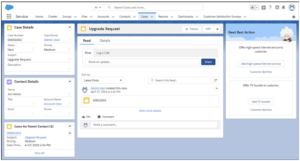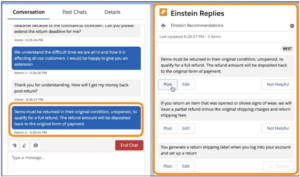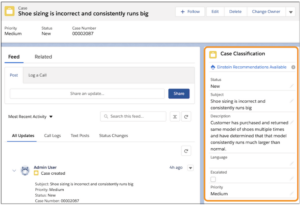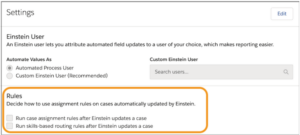BLOG
Is 2024 the year for leveraging customer loyalty?

According to a recent report, customer retention has now become the top goal for e-commerce websites, for example, standing at 59%. It overtook conversion (55%) and acquisition (45%). If your business objectives need measurable retention strategies, you can take advantage of lucrative opportunities to reduce customer churn while securing long-term customer relationships. Almost half (44%) of companies focus on customer acquisition, but barely 18% of these companies surveyed include customer retention in their initiatives. In addition, there is a 60-70% chance of selling to an existing customer.
Meanwhile, when it comes to new customers, the chance of closing a sale stands at just 5-20%. To stay competitive in a fast-paced market, companies must connect with customers at pivotal points of the customer’s journey with consistent and personalized service. Salesforce CRM integrated with Service Cloud systems makes a seamless customer experience possible.
Let’s highlight some of the customer-focused features of Service Cloud and illustrate how this platform, when paired with Sales Cloud, contributes to a seamless customer journey.
The Key To Exceptional Service: Putting The Customer At The Center Of Everything We Do
With Salesforce CRM as a single source of truth, offering a Customer 360 view of complete customer profiles, real-time data updates, and AI-backed analytics for accurate segmentation, Service Cloud maintains positive customer relationships with features like omnichannel customer support, and it automates access to the most common solutions. An AI-supported knowledge base that is constantly gathering and analyzing real-time data empowers agents to quickly access the problem and provide quick answers or solutions that delight customers. In our experience, helping clients improve customer retention, Salesforce Service Cloud bolsters customer loyalty with delightful experiences. Along with simplifying customer data management with one platform, here are three other ways companies that use Service Cloud gain a better understanding of their customer with efficient and practical tools.
- 1. Quick Responses
“Quick” is the operative word here. Most customers (84 percent) expect a response to a question within 24 hours. Even if it’s through a chatbot or ticketing system when that service level is achieved, customer loyalty is within range, and so is growth. Here’s why: Around 90% of Americans use customer service as a factor when deciding to do business with a company. Companies agree. Regarding factors that impact customer retention, 89% of companies admit excellent customer service is critical. Finally, there is a 60-70% chance of selling to an existing customer.
Tools That Simplify Customer Support:
Omni-Channel Routing
This tool intelligently distributes customer inquiries to the most suitable agents based on their skills and availability, ensuring quicker responses.
Live Agent Chat
Real-time chat functionality allows agents to engage with customers immediately, providing swift assistance.
Email-To-Case
Automatically converts customer emails into support cases, making it easier for agents to manage and respond.
Service Console
A unified view of customer information, cases, and communication channels helps agents respond faster and more effectively. An extensive knowledge base empowers customers to find answers to their questions independently, reducing the need for agent intervention.
AI-Powered Bots
Chatbots and virtual assistants can provide instant responses to common customer queries, freeing up human agents for more complex issues.
Automated Workflows
Create automated processes for routine tasks, such as sending confirmation emails or updating case statuses, to expedite responses.
- 2. Proactive Support
Unlike traditional reactive support, which primarily focuses on addressing customer issues after they arise, proactive customer service anticipates and addresses potential problems before they escalate. This proactive approach recognizes that fostering solid and lasting customer relationships goes beyond resolving complaints – it involves anticipating customer needs, preventing issues, and exceeding expectations. In this era of empowered and informed consumers, businesses that prioritize proactive customer service gain a significant edge in not only retaining their existing customer base but also in attracting new customers and enhancing their brand reputation.
Tools That Simplify Proactive Services:
Omnichannel Support
Service Cloud offers omnichannel support, which allows you to manage customer interactions across multiple communication channels, including email, social media, phone, and chat. This ensures that you can proactively address customer inquiries, no matter where they come from.
AI-Supported Predictive Analytics
Service Cloud can leverage predictive analytics and artificial intelligence to analyze historical customer data and predict customer needs and potential issues. AI-powered tools can also assist in automatically routing cases or suggesting solutions to support agents.
Surveys And Feedback Tools
You can create and distribute surveys and feedback forms within Service Cloud to collect customer input. Analyzing the feedback can help identify areas for improvement and address issues before they become widespread.
Service Analytics
Service Cloud’s analytics capabilities allow you to gain insights into your support performance and customer satisfaction. This data can be used to make data-driven decisions and continuously improve your proactive support strategies. With growing expectations among consumers to deliver quick–if not immediate–responses to their needs, companies who invest in cloud systems that anticipate and respond to demands are leading in their industry.
- 3. Personalized Services
Artificial Intelligence (AI) has rapidly emerged as an indispensable tool for businesses seeking to boost customer retention. With the ability to analyze vast amounts of data, deliver personalized experiences, and predict customer behavior, AI has revolutionized how companies engage with their clientele. “The future of customer service starts with learning what your customers expect today — a personalized and connected experience,” Brenda Bown at Salesforce explained. “The catch? You need to focus on productivity and cost savings without compromising on quality.” The right technology can help. Bown added, “As we look ahead to the future of customer service, generative AI will play an essential role in finding cost-effective ways to meet customers’ changing expectations.” Einstein AI, an AI technology native to Salesforce, serves as the foundational technology for the Service Cloud platform. With its capabilities in natural language processing (NLP), machine learning (ML), deep learning, and predictive analytics, this artificial intelligence empowers businesses to gain a deeper understanding of their customers. “With generative AI layered onto Einstein for Service and Customer 360, we’ll have the ability to automatically generate personalized responses for agents to quickly email or message to customers,” Clara Shih, CEO of Salesforce AI, said. “We’ll be able to train the AI across all the case notes ever written by every agent at the company to automatically generate drafts of knowledge articles for human review, drastically cutting the time to create knowledge and making it easier to keep articles up to date.” Improved access to data-driven knowledge throughout the organization will increase the effectiveness of self-service portals and chatbots, thereby allowing human agents to allocate more of their time to in-depth interactions with complex issues and the cultivation of enduring customer connections.
Increasing Customer Retention Rates By 5% Has Increased Overall Profits By 25% To 95%.
Transforming workflow processes with cloud CRM and Service Cloud Einstein can make a measurable, positive impact on customer support services for efficient customer acquisition and higher retention.
Critical Tools Of Service Cloud Einstein
Einstein Next Best Action
This function provides suggestions for a user’s next course of action. Generate recommendations based on the unique strategies and logic designed for each business, such as extending a subscription or signing specific documents. When a recommendation is presented, an agent can accept or reject it. Each recommendation includes an image, key text elements like button text with a description, and an associated flow that activates when a user responds.
 Source: Salesforce.
Source: Salesforce.
Einstein Reply Recommendations
It’s well known that customer service agents handle similar questions repeatedly. When the customer asks a question, Einstein allows you to select from a short list of relevant responses for open chats or messaging sessions. Salesforce offers reply recommendations in 16 languages: English, German, Arabic, Chinese-simplified, Chinese-traditional, Dutch, French, Italian, Japanese, Korean, Polish, Portuguese, Russian, Spanish, Thai, and Turkish.
 Source: Salesforce.
Source: Salesforce.
Einstein Case Classification
With Machine Learning, Einstein AI can examine past customer interactions, resolved cases, and chat records. For instance, customers may complain about troubles while configuring payment terminals. AI categorizes these trends based on the settings and criteria you’ve specified. Then, the performance dashboard creates insights into the effectiveness of Einstein’s predictions. It allows you to assess how well these predictions align with the actual outcomes when the case is resolved.
 Source: Salesforce.
Source: Salesforce.
Einstein Case Routing
Once the cases have been categorized, they should be directed to the appropriate agents within the Field Service team, ensuring that the most suitable agent handles each case. For instance, Chris excels in configuring PS systems, while Lauren excels in setting up TVs. Routing can be based on both skills and queues, allowing for precise and efficient allocation of cases.
 Source: Salesforce.
Source: Salesforce.
Service Cloud solutions, fortified by the transformative power of Artificial Intelligence, have redefined the landscape of customer retention. By harnessing the capabilities of AI-driven insights, predictive analytics, and personalized support, businesses can forge deeper connections with their customers, leading to enhanced loyalty and prolonged relationships.
With AI at the helm, Salesforce Service Cloud not only empowers organizations to address customer needs proactively but also to anticipate and resolve issues before they arise, ultimately resulting in unparalleled customer satisfaction and retention.
